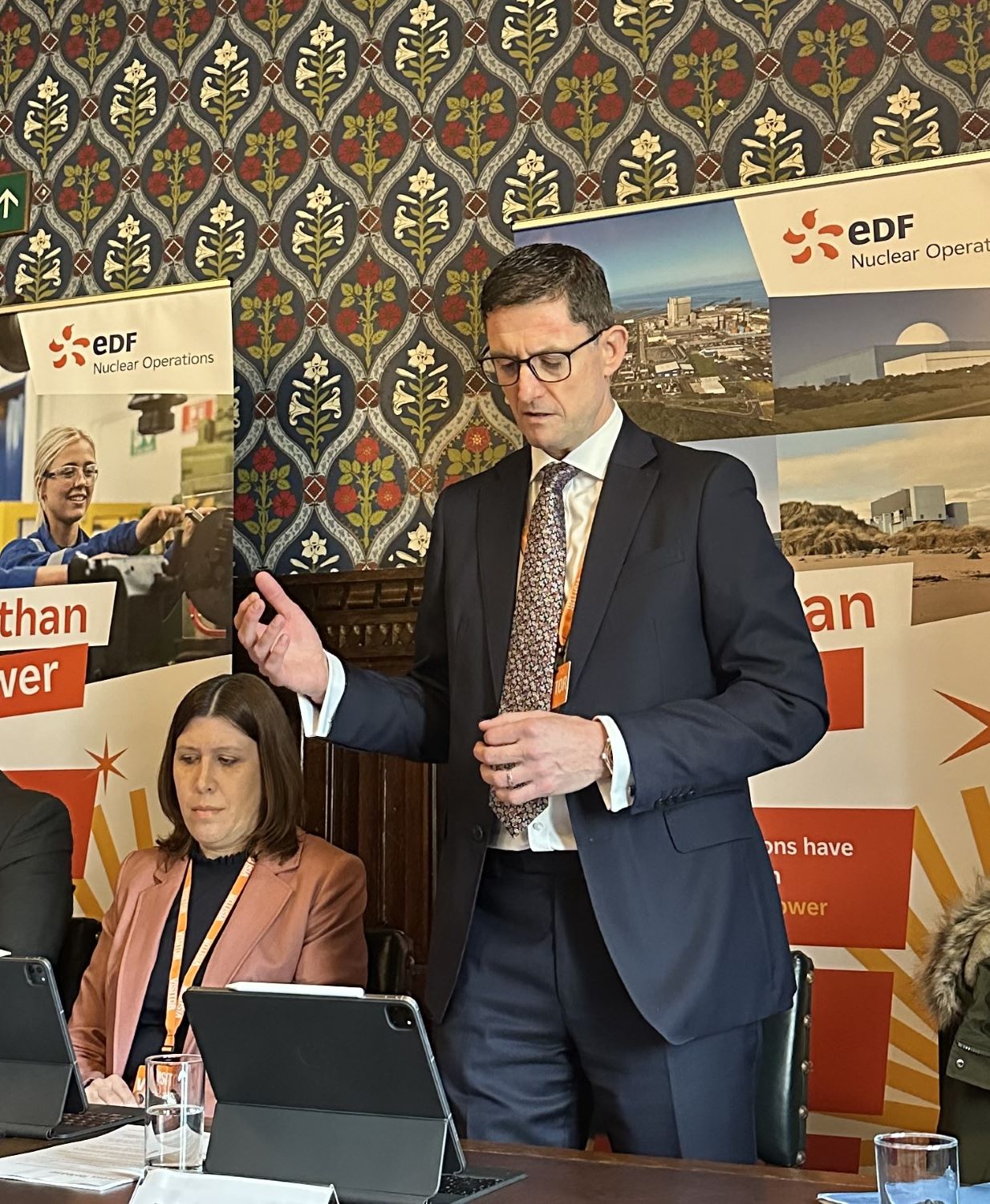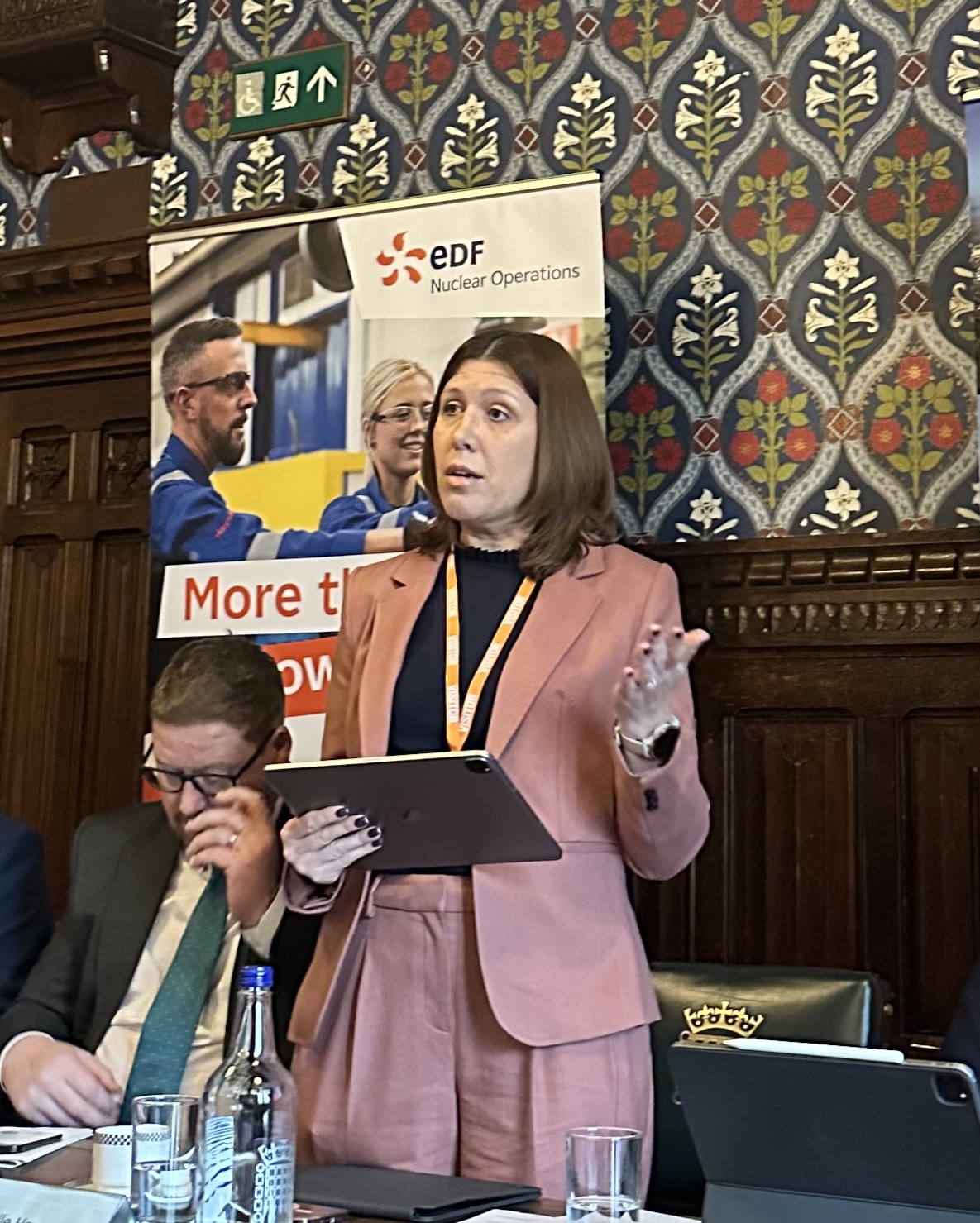The UK’s nuclear power stations have contributed £123 billion to our economic growth
Panel from left to right: EDF Nuclear Decommissioning Director Paul Morton, Jonathan Brash MP for Hartlepool, EDF Technical Director Michelle Hoy and Dr Mark Hartley Managing Director of EDF’s Nuclear Operations.
Investment in the nuclear industry is paying dividends for the Government’s net zero objectives, the economy and local communities
Nuclear energy has made a significant contribution to economic growth in the UK over the last five decades – supporting tens of thousands of jobs, helping the drive to net zero and benefiting the wider economy.
That’s the verdict of a new report from independent consultants Economic Insight which looks at the economic impact of the UK’s fleet of eight nuclear power stations during their operational lives.
The UK currently has five operational nuclear power plants, all owned by EDF, the UK’s largest producer of low-carbon electricity. In total, these sites deliver around 13% of the UK’s power. Three advanced gas-cooled reactors (AGRs) have ceased generation and are in the defueling phase, the first stage of decommissioning.
The report – Economic Impact of EDF’s Nuclear Fleet from 1976 to 2024 – was launched at an event hosted by EDF as part of Nuclear Week in Parliament, a programme organised by the Nuclear Industry Association (NIA). The House of Commons event was attended by parliamentarians, policy makers, industry leaders and other key stakeholders.
The Economic Insight report shows that the UK’s nuclear fleet supported 31,000 jobs a year when all eight stations were generating. Five thousand of these were directly with EDF, with the rest mostly coming through the supply chain and businesses in the local economy.
The existing nuclear power stations have to date made a contribution of £123 billion to UK economic growth. More than 90% of supply chain expenditure has been delivered in the UK during operations and 1.1 billion tonnes of carbon have been avoided (equivalent to taking all cars off UK roads for 16 years).
 “It's a really important time for the UK nuclear industry,” said Dr Mark Hartley, Managing Director of EDF’s Nuclear Operations business.
“It's a really important time for the UK nuclear industry,” said Dr Mark Hartley, Managing Director of EDF’s Nuclear Operations business.
“Nuclear power stations do not just produce zero-carbon electricity, they have supported tens of thousands of livelihoods for decades.
“This is the first time the economic impact of the operating phase of the fleet has been analysed in this way. Seeing how the combined value of the power, jobs and supply chain adds up over time really helps to throw into sharp relief the positive impact that these facilities have over growth.
“The investment made in these stations over nearly 50 years has paid dividends, and will continue to do so, not just for the people working and living close to the stations but also the millions who benefit from the zero-carbon electricity they produce.”
Much of the discussion at the event focused on jobs – both in the nuclear industry itself and in the supply chain.
Generations of families work in the industry, including Greig Elliot, who started his career as an apprentice at Torness nuclear power station in East Lothian and is now the Fuel Route Manager.
“The nuclear industry has supported my family for more than 40 years,” he said. “My grandfather worked at the site during construction, my father also started on construction the week I was born and I have been working here for more than 27 years. I have seen first-hand the benefits that nuclear can bring to areas like East Lothian and Scotland and I am proud to be part of that.”
The EDF event also marked the publication of its annual fleet stakeholder update, which outlines the performance of the fleet over the past year as well as its future plans.
Priorities over the next decade include delivering long-term value from the Sizewell B power station in Suffolk, maximising output from the four generating AGR stations, defueling them efficiently and seamlessly transferring them to Nuclear Restoration Services (NRS). By the mid-2030s all seven of the AGR stations will be owned by the Government
 The panel, which included EDF Nuclear Decommissioning Director Paul Morton, EDF Technical Director Michelle Hoy and Economic Insight Principal Madeleine Matos, also discussed the importance of skills and training in the industry. EDF’s current nuclear fleet employs large numbers of graduates but also offers a range of apprenticeships and degree apprenticeships.
The panel, which included EDF Nuclear Decommissioning Director Paul Morton, EDF Technical Director Michelle Hoy and Economic Insight Principal Madeleine Matos, also discussed the importance of skills and training in the industry. EDF’s current nuclear fleet employs large numbers of graduates but also offers a range of apprenticeships and degree apprenticeships.
The event was chaired by Jonathan Brash, Labour MP for Hartlepool, who said that the Government, the industry and the country need “to have a really honest conversation in terms of what we’re prepared to do if we want our nuclear industry to thrive”.
“You only have to look at the economic impact of the current fleet that we have here in the UK to see that the size of the contribution to Britain’s economy – £123 billion pounds – is extraordinary,” he said.
He added that Hartlepool is the perfect case study for the industry. Now more than 40 years old, the Hartlepool plant is capable of supplying electricity to more than two million UK homes. A third of the constituency’s economic footprint is provided by the power station, along with 700 jobs and many more in the supply chain.
Mr Brash spoke about the “gigantic” social value that Hartlepool’s nuclear power station has brought to the area.
“There is an argument to be made, that I don’t think the industry makes enough, which is that it’s not just about energy and generation, power and economics. It’s about how you can transform communities that need to be transformed. And EDF has been a big part of that over the last decade in Hartlepool.
“The importance to my constituency is extraordinary, and that is the case across our country. If we're going to meet our goals, if we're going to decarbonise our industries, if we're going to hit our net zero targets, then the reality is that nuclear isn't only part of the solution. It is the key part of the solution.”
